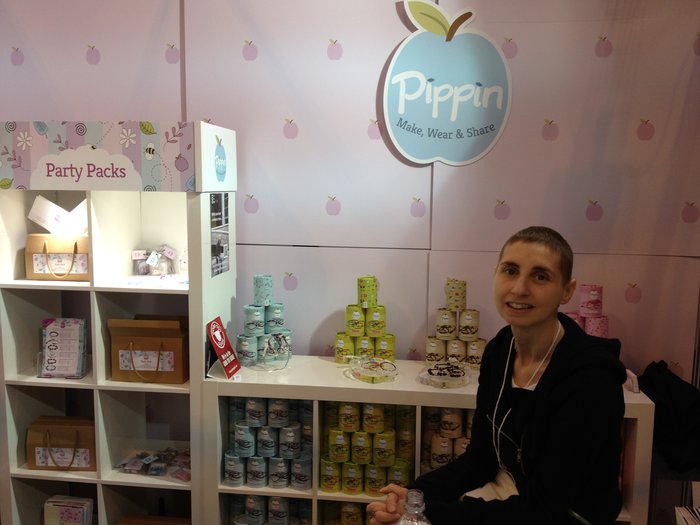I was the boss with blood cancer
Louise, 41, was diagnosed with Hodgkin lymphoma in 2012. She’s now in remission and back working in the family business.

Louise, 41, was diagnosed with Hodgkin lymphoma in 2012. She’s now in remission and back working in the family business.
Since the age of 22, I’ve worked in the family business. But it’s been part of my life for much longer – I’ve essentially grown up with it.
It’s a quirky company, started by my father (who’s a geologist), selling semi-precious gemstones and similar products. During my first few years in the business, I took on more and more responsibility. By my late twenties, I was managing an entire division – supplying jewellery designers with gemstones and other jewellery-making supplies.
I left the company briefly to have my children, but it continued to be a huge part of my life, in the same way it was for my dad while I was growing up. After two brief periods of maternity leave, I was eager to get back to work, juggling the demands of the business alongside the care of my two young children.
When everything changed
When my then five-year-old had just started school, I received the life-changing news that I had a blood cancer – Hodgkin lymphoma, stage 2b.
I had known something was wrong for a year before I was finally diagnosed. I was repeatedly told it wasn’t cancer by the local GP surgery – depression… stress… anything but cancer.
By the point of diagnosis, work was hard, as I was preoccupied with thoughts of, “What on earth could be wrong with me?”.
The effects of the cancer were overwhelming me with tiredness, weight loss, infections and worry.
The best-laid plans
During the previous three months, we had launched a children’s jewellery kit range at work, called Pipkits. We’d just got the range stocked by a major retailer and suddenly I was looking at six months of intensive chemotherapy.
The plan was to let our staff look after the day-to-day running of the business, with my father there to help advise. Then, when I was well enough, I would work on the Pipkits range, which would be a welcome distraction from treatment. I enjoyed having something to focus on and this plan worked quite well in the short term.
Unfortunately, the goalposts kept shifting and, although I was initially told treatment would take six months, I ended up having 20 months of active treatment and a donor bone marrow transplant. This resulted in a long period of convalescence before returning to a ‘new normal’ in late 2014.
Making adjustments
After my transplant, my office was given a thorough clean. I would go in and work a few hours, with the staff under strict instructions not to come near me if they had even the slightest hint of a bug.
Truth be told, I never fully returned to the job I left pre-diagnosis. I quickly accepted that working full-time was going to be a hard task. Luckily, we’ve managed to make my role more flexible and I’ve done my best to make that work to my advantage.
I’ve discovered that I can get a lot of work done from home. We recently relaunched our company website – a major job that involved moving 10,000 products onto a new site. I managed to do most of this work remotely.
Prioritising what’s important
I try to get into work for at least a few hours every day. But I also do the school run and ensure I’m home for the kids every day after school. In exchange, I tend to work a few hours from home in the evenings, which works well for me.
I also ensure that there’s a team at work who can keep things on track. I just make sure I’m available by phone or email during working hours.
I know I’ve been very lucky to have these options, but surviving blood cancer has taught me to prioritise my time and plan around what I now consider to be important.
Accepting help from family
My family tried to keep me away from stressful work issues while I was having treatment, and I found this loss of control difficult. But it was easy to get back into it once I was ready, and since my treatment has finished, the business has given me something to focus on.
Before I got to this point, and my future seemed uncertain, I realised that it helped to focus on the next 24 hours. I always made sure I had something nice planned to look forward to. This was a massive turning point for my mental health, and it’s something I’ve taken forward with me into my new working week.
I meet my dad for breakfast most mornings before work and we start the day with a meeting over a coffee.
Find what works for you
If you’re self-employed and are adjusting to work life with or after blood cancer, my advice would be to accept that you have to delegate. Use technology to your advantage, but also know when to turn off your emails. And embrace quick catch-ups and phone calls – most things can be dealt with that way.
But above all, if you can, create a working day that works for you and your needs. It can make the world of difference.
Janssen-Cilag Ltd has supported Blood Cancer UK with funding for the production of this web page and others within the ‘Living well’ section. It had no influence over the content.

Share your story about living well
Your experience can help others with blood cancer
